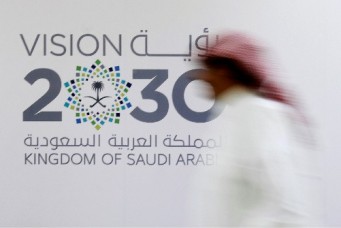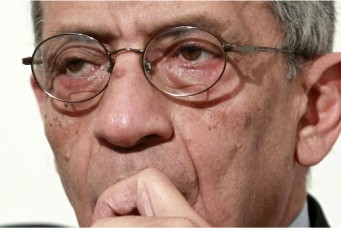Saud Al-Faisal: Statesman Diplomat
Saudi Arabia’s longtime minister of foreign affairs, Prince Saud Al-Faisal passed away this Ramadan. He was among the kingdom’s most influential men. A former Egyptian foreign minister reflects on the Arab statesman and diplomat.

Saudi Arabia’s Foreign Minister arrives in South Korea for a gathering of global leaders, November 10, 2010. Jo Yong-Hak/Reuters/Corbis
My first encounter with Prince Saud Al-Faisal, who passed away in Ramadan this year, occurred forty years ago. Newly appointed as Saudi Arabia’s foreign minister after the assassination of his father, King Faisal, he came to visit my father, Ismail Fahmy, who was Egypt’s foreign minister at the time, at our beach house in Alexandria. Decades later when I served as foreign minister myself, it was moving to hear the prince state publicly, with obvious emotion, that he was proud to have worked with father and son. In every encounter we had as the foreign ministers of our respective countries, he broke protocol and precedent to be especially courteous and cordial.
My admiration for Prince Saud went beyond his refined civility. He showed steely backbone in standing firm against policies he objected to. He took a results-oriented approach to diplomacy, and came up with creative new ideas, pushing boundaries on intractable issues. He astutely agreed to proposals when less-than-ideal options were on the table. He showed great wisdom and professionalism in dealing with pressing issues without losing sight of the big picture or strategic objectives.
Many will remember Prince Saud’s strong positions and sustained efforts in support of Egypt after the June 30, 2013 revolution—emulating the support King Faisal gave to Egypt with the oil embargo after the 1973 Arab-Israeli War. He was instrumental in negotiating the 1989 Taif Agreement, which ended fourteen years of civil war in Lebanon. Also to his credit was the Saudi peace initiative adopted by the Arab Summit in Beirut in 2002 as the Arab Peace Plan.
Prince Saud often asked Egypt to pursue its proposal for a WMD-free Middle East, yet despite American double standards on the issue urged us (unsuccessfully) against boycotting talks on the Nuclear Non-Proliferation Treaty. In 2013, Saudi Arabia stunned the diplomatic community by refusing to accept a seat on the fifteen-member United Nations Security Council because of its ineffectiveness and the double standards of its members. Prince Saud listened patiently and seriously to my ultimately unsuccessful arguments to convince Saudi Arabia to reverse its decision.
Prince Saud’s wisdom was evident in our handling of the Arab position on President Barack Obama’s aborted endeavor to bomb Syria in 2013. On this tactical step Saudi Arabia and a number of Arab countries supported using force. Egypt and others did not. I had a meeting with Prince Saud, where it was evident that our positions were close on everything but the bombing. In our discussions I also emphasized to everyone’s astonishment that Obama would ultimately not bomb Syria. We drafted mutually agreed language that put the responsibility clearly and forcefully on the Syrian regime, but stayed short of paving the way for the United States to bomb Syria under the guise of an Arab League resolution à la Libya. For many months afterward Prince Saud would joke with me about my correct reading of American politicians.
Such tactical disagreements never affected relations between our two countries or their officials. In fact, they were catalysts to numerous phone calls and consultations between us on a wide range of things concerning our respective national developments and the ever-turbulent Middle East, with a view to building a better future for the region. Prince Saud Al-Faisal was a statesman diplomat and he will be missed.
Nabil Fahmy, a former foreign minister of Egypt, is the dean of the School of Global Affairs and Public Policy at the American University in Cairo. He served as Egypt’s ambassador to the United States from 1999–2008, and as envoy to Japan between 1997 and 1999.





